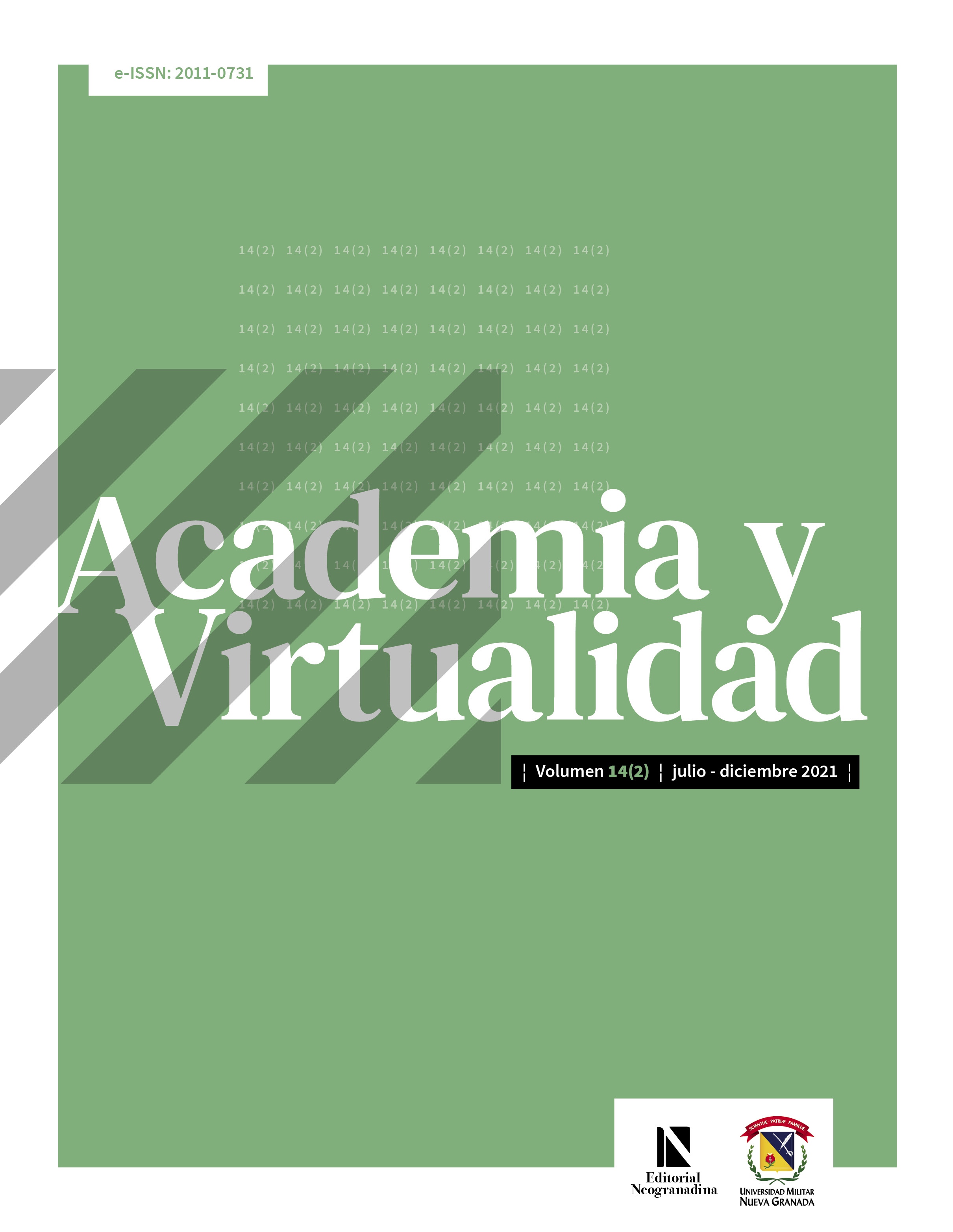Emotional Intelligence in University Students of the Program of Psychology: Differences Between the First and the Last Course
Abstract
Previous research showed the importance of Emotional Intelligence (IE) in the professional field, especially in the adaptation and success of psychologists. The aim of this study was to find the differences in ie between psychology students in their first and last year. The sample consisted of 90 first-year students (18.37 ± 2.06 years; 80 % women) and 90 final year students (20.54 ± 1.28 years; 76 % women). The IE (i.e., perception, understanding, management and total (IE) was evaluated using the Mobile Emotional Intelligence Test. The main findings indicated that the fourth-year students of the Psychology program had significantly higher scores in the management dimension (104.8 vs. 97.5; p = .019), as well as in their total IE (107.1 vs. 101.4; p = .011) compared to their first-year classmates. At the end of the document the importance of developing IE in psychology students is discussed.
Downloads
References
Ackley, D. (2016). Emotional intelligence: a practical re- view of models, measures, and applications. Consulting Psychology Journal: Practice and Research, 68(4), 269-286. https://doi.org/10.1037/cpb0000070
Alecsiuk, B. (2015). Inteligencia emocional y desgaste por empatía en terapeutas. Revista Argentina de Clínica Psicológica, 24(1), 43-56. https://www.redalyc.org/ pdf/2819/281944843006.pdf
Arias, C. J. y Giuliani, M. F. (2014). Explorando la inteligencia emocional percibida en tres franjas etarias. Un estudio realizado en la Argentina. Estudos Inter- disciplinares sobre o Envelhecimento, 19(1), 123-140. https://doi.org/10.22456/2316-2171.31312
Azpiazu, L., Esnaola, I. y Sarasa, M. (2015). Capacidad predictiva del apoyo social en la inteligencia emocional de adolescentes. European Journal of Education and Psychology, 8(1), 23-29. https://doi.org/10.1016/j.ejeps.2015.10.003
Belfield, C., Brooks, A., Klapp, A., Levin, H., Shand, R. y Zander, S. (2015). The economic value of social and emotional learning. Journal of Benefit-Cost Analysis, 6(3), 508-544. https://doi.org/10.1017/bca.2015.55
Cabello, R., Sorrel, M. A., Fernández Pinto, I., Extreme- ra, N. y Fernández Berrocal, P. (2016). Age and gender differences in ability emotional intelligence in adults: a cross-sectional study. Developmental Psychology, 52(9), 1486-1492. https://doi.org/10.1037/dev0000191
Carvalho, V. S., Guerrero, E. y Chambel, M. J. (2018). Emotional intelligence and health students' well-being: a two-wave study with students of medicine, physiotherapy and nursing. Nurse Education Today, 63, 35-42. https://doi.org/10.1016/j.nedt.2018.01.010
Castaño Castrillón, J. J. y Páez Cala, M. L. (2014). Inteligencia emocional y rendimiento académico en estudiantes universitarios. Psicología desde el Caribe, 32(2), 268- 285. https://doi.org/10.14482/psdc.32.2.5798
Cassullo, G. L. y García, L. (2015). Estudio de las competencias socio emocionales y su relación con el afrontamiento en futuros profesores de nivel medio. Revista Electrónica Interuniversitaria de Formación del Profesorado (Reifop), 18(1), 213-228. https://doi.org/10.6018/reifop.18.1.193041
Chaffey, L., Unsworth, C. A. y Fossey, E. (2012). Relations- hip between intuition and emotional intelligence in occupational therapists in mental health practice. American Journal of Occupational Therapy (ajot), 66(1), 88-96. https://doi.org/10.5014/ajot.2012.001693
Cohen, J. (1977). Statistical power analysis for the behavioral sciences. Academic Press. https://www.sciencedirect. com/book/9780121790608/statistical-power-analy-sis-for-the-behavioral-sciences
Dymnicki, A., Sambolt, M. y Kidron, Y. (2013). Improving college and career readiness by incorporating social and emotional learning. College and Career Readiness and Success Center at American Institutes for Research (air). https://files.eric.ed.gov/fulltext/ED555695.pdf
Extremera Pacheco, N., Mérida López, S. y Sánchez Gómez, M. (2019). La importancia de la inteligencia emocional del profesorado en la misión educativa: impacto en el aula y recomendaciones de buenas prácticas para su entrenamiento. Voces de la Educación, (número especial 2), 74-97. https://www.revista.vocesdelaedu-cacion.com.mx/index.php/voces/article/view/213/182
Fernández Berrocal, P. y Extremera, N. (2016). Ability emotional intelligence, depression, and well-being. Emotion Review, 8(4), 311-315. https://doi.org/10.1177/1754073916650494
Fragoso Luzuriaga, R. (2015). Inteligencia emocional y competencias emocionales en educación superior, ¿un mismo concepto? Revista Iberoamericana de Educación Superior, 6(16), 110-125. https://doi.org/10.1016/j.rides.2015.02.001
García, M., Hurtado, P. A., Quintero, D. M, Rivera, D. A. y Ureña, Y. C. (2018). La gestión de las emociones, una necesidad en el contexto educativo y en la formación profesional. Revista Espacios, 39(49), 8. https://www.revistaespacios.com/a18v39n49/18394908.html
Gardner, H. (1983). Frames of mind: the theory of multi- ple intelligences. Basic Books. https://www.academia. edu/36707975/Frames_of_mind_the_theory_of_multiple_inteligences
Gómez Ortiz, O., Eva, M. y Ortega Ruiz, R. (2017). La competencia para gestionar las emociones y la vida social, y su relación con el fenómeno del acoso y la convivencia escolar. Revista Interuniversitaria de Formación del Profesorado, 31(1). https://www.redalyc.org/articulo.oa?id=27450136006
Hernández, A. K., Ledesma, L. E., Olivas, O. L., Martínez, S. E. y Escorza, M. A. Q. (2016). Análisis de la relación entre el estilo de vida y la inteligencia emocional en estudiantes universitarios. Ciencia y Humanismo en la Salud, 3(1), 14-23.
Lea, R. G., Davis, S. K., Mahoney, B. y Qualter, P. (2019). Does emotional intelligence buffer the effects of acute stress? A systematic review. Frontiers in Psychology, 10, 810. https://doi.org/10.3389/fpsyg.2019.00810
Lopes, P. N., Salovey, P., Côté, S., Beers, M. y Petty, R. E. (eds.). (2005). Emotion regulation abilities and the quality of social interaction. Emotion, 5(1), 113-118. https://doi.org/10.1037/1528-3542.5.1.113
MacCann, C., Joseph, D. L., Newman, D. A. y Roberts, R. D. (2014). Emotional intelligence is a second-stratum factor of intelligence: evidence from hierarchical and bifactor models. Emotion, 14(2), 358-374. https://doi.org/10.1037/a0034755
Mayer, J. D., Caruso, D. R. y Salovey, P. (1999). Emotional intelligence meets traditional standards for an intelligence. Intelligence, 27(4), 267-298. https://doi.org/10.1016/S0160-2896(99)00016-1
Mayer, J. D., Caruso, D. R. y Salovey, P. (2016). The ability model of emotional intelligence: principles and updates. Emotion Review, 8(4), 290-300. https://doi.org/10.1177/1754073916639667
Rodríguez de Alba, U. y Suárez Colorado, Y. (2012). Relación entre inteligencia emocional, depresión y rendimiento académico en estudiantes de psicología. Psicogente, 15(28), 348-359. https://www.redalyc.org/pdf/4975/497552361011.pdf
Ruiz, P. y Carranza, R. F. (2018). Inteligencia emocional, género y clima familiar en adolescentes peruanos. Acta Colombiana de Psicología, 21(2), 188-211. https://doi.org/10.14718/ACP.2018.21.2.9
Salovey, P. y Mayer, J. D. (1990). Emotional intelligence. Imagination, Cognition and Personality, 9(3), 185-211. https://doi.org/10.2190/DUGG-P24E-52WK-6CDG
Sánchez-Gómez, M. y Bresó, E. (2018). Inteligencia emocional para frenar el rechazo en las aulas. Agora de Salut, 5, 275-282. https://doi.org/10.6035/agorasalut.2018.5.30
Sánchez-Gómez, M. y Bresó, E. (2019). The Mobile Emotional Intelligence Test (MEIT): an ability test to assess emotional intelligence at work. Sustainability, 11(3), 827. https://doi.org/10.3390/su11030827
Sánchez-Gómez, M. y Bresó, E. (2020). In pursuit of work performance: testing the contribution of emotional intelligence and burnout. International Journal of Environmental Research and Public Health, 17(15), 5373. https://doi.org/10.3390/ijerph17155373
Villardón Gallego, L. y Yániz, C. (2014). Características psicométricas de la Escala de Estrategias Afectivas en el proceso de aprendizaje (EEAA). Electronic Journal of Research in Education Psychology, 12(34), 693-716. https://doi.org/10.25115/ejrep.34.14095
Weissberg, R. P. (2019). Promoting the social and emotional learning of millions of school children. Perspectives on Psychological Science, 14(1), 65-69. https://doi.org/10.1177/1745691618817756











